|
|
|
Sort Order |
|
|
|
Items / Page
|
|
|
|
|
|
|
| Srl | Item |
| 1 |
ID:
152521
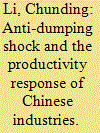

|
|
|
|
|
| Summary/Abstract |
This paper provides a comprehensive analysis of the productivity effects of antidumping (AD) measures on Chinese industries. Industry-year panel data and generalized method of moments estimators are used in the empirical analysis. Productivity indicators are calculated using data envelope analysis. The empirical results show that China's industrial total factor productivity has improved under the pressure of AD measures taken by developed countries, and the mechanism inspires technological progress but hurts technological efficiency. Developing countries' AD measures have no significant productivity effects on China's targeted industries, except for slightly positive effects on technological efficiency. These results indicate that China should pay more attention to technological innovation and take different counter-measures for different cases of AD measures.
|
|
|
|
|
|
|
|
|
|
|
|
|
|
|
|
| 2 |
ID:
062456
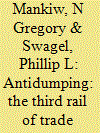

|
|
|
|
|
| Publication |
Jul-Aug 2005.
|
| Summary/Abstract |
Although few U.S. politicians will admit it, antidumping policy has strayed far from its original purpose of guarding against predatory foreign firms. It is now little more than an excuse for a few powerful industries to shield themselves from competition -- at great cost to both American consumers and American business
|
|
|
|
|
|
|
|
|
|
|
|
|
|
|
|
| 3 |
ID:
161869
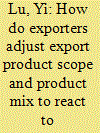

|
|
|
|
|
| Summary/Abstract |
Using Chinese customs data covering all exporters over 2000–06, this paper empirically investigates how Chinese multi-product exporters adjust their product scope and product mix to react to U.S. antidumping. The estimation results indicate that surviving exporters experiencing antidumping would reduce their overall export product scope and concentrate on fewer more successful products, although the overall export value does not change. Specifically, they drop many pre-existing peripheral export products and simultaneously introduce new products that are closer to their main industry into the U.S. market. The analysis also finds that the sophistication of surviving exporters' export product mix increases in response to antidumping, and they export more products that have higher upstreamness.
|
|
|
|
|
|
|
|
|
|
|
|
|
|
|
|
| 4 |
ID:
108354
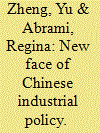

|
|
|
|
|
| Publication |
2011.
|
| Summary/Abstract |
Why have China's petrochemical and steel industries behaved so differently in seeking trade protection through antidumping measures, especially given that both industries face the full force of the global economy? We argue that the patterning of antidumping actions is best explained in terms of industrial structures, inclusive of degrees of horizontal concentration and vertical integration. These structures determine a firm's motivation to seek protection as well as its capacity to overcome collective action problems within its industry. In the petro-chemical industry, the shift toward greater horizontal consolidation and vertical integration reduces the collective action problems associated with antidumping petitions among upstream companies. It also weakens downstream companies lobbying in favor of the general protection of highly integrated conglomerates. In the steel industry, by contrast, national industrial policy fails to weaken local state interests sufficiently. Fragmented upstream and downstream channels instead persist, with strong odds against upstream suppliers waging a successful defense of material interests. Such distinctive industrial structures, we show, were a direct result of whether the central government could restructure these designated priority industries in its preferred direction. We find that exogenous price shocks proved particularly helpful in this regard.
|
|
|
|
|
|
|
|
|
|
|
|
|
|
|
|
| 5 |
ID:
161839
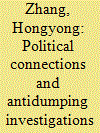

|
|
|
|
|
| Summary/Abstract |
Do political connections affect antidumping (AD) investigations? To address this question, we use antidumping filings data combined with micro data on Chinese manufacturing firms for the period 1998–2007. The political connections of a firm are defined by whether it has state-owned capital or whether it is under the administration of central or provincial government. Estimating a probit model of AD filings at the firm level, we find that strong political connections significantly increase the likelihood of AD petitions and affirmative final dumping decisions. State-owned enterprises, firms affiliated with the central or provincial government, low productivity firms, and large firms tend to file AD investigations in China. The industry-level estimation results also confirm that the industries with a greater presence of state-owned enterprises are likely to apply for and receive trade protection from the Chinese government, controlling for import penetration, year, and industry fixed effects.
|
|
|
|
|
|
|
|
|
|
|
|
|
|
|
|
| 6 |
ID:
090809
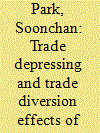

|
|
|
|
|
| Publication |
2009.
|
| Summary/Abstract |
China is by far the main target of antidumping (AD) litigation for most of its major trading partners. Recently, however, China itself has started using AD instrument intensively and was, in fact, the third leading country in initiating AD investigations between 2002 and 2004. This paper empirically investigates the impact of China's AD activities on trade by employing the system GMM estimator. The empirical results show that AD protection has significant trade depressing and trade diversion effects. These findings are consistent with Prusa [Prusa, T.A., 2001. On the Spread and Impact of Antidumping, Canadian Journal of Economics 34, 591-611.] and Brenton [Brenton, P., 2001. Anti-dumping policies in the EU and trade diversion, European Journal of Political Economy 17, 593-607] that investigate the trade effects of AD actions in the US and EU, respectively.
|
|
|
|
|
|
|
|
|
|
|
|
|
|
|
|
|
|
|
|
|